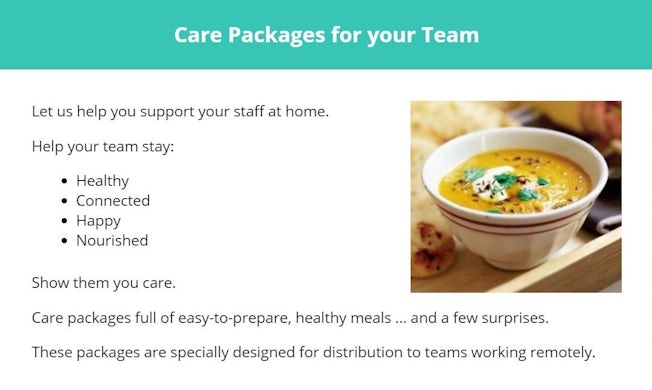But it continues to be true, and thousands of businesses across the world have been forced to grapple with what it means for how they make money. With ‘business as usual’ completely out the window, many have scaled back services, or simply closed their doors, relying on government-provided stimulus money to keep their businesses afloat until the pandemic is over. Others have folded altogether.
A number of innovative businesses, however, are finding creative ways to cater to the new types of demand created by the pandemic: for virtual entertainment, goods delivered to your door, fitness from home, office culture in a remote working environment, and more. Many have reinvented their product offerings, or are finding new ways to deliver them to customers, in the midst of a pandemic.
Here are six examples of businesses and brands that are innovating and transforming their product offering during the coronavirus pandemic.
Cheeky Food Events
Events, oriented as they are around large gatherings of people in a space, were one of the earliest casualties of the coronavirus pandemic, with major conferences being cancelled and entertainment venues closing their doors even before full lockdowns were implemented in most countries.
For companies whose business is corporate events, the impact was particularly dire, because workplaces also quickly shifted to remote working to minimise the spread of coronavirus. Cheeky Food Events, an Australian company that offers corporate team-building activities oriented around cooking, found itself needing to rethink its business model for a newly-distributed world of work.
The company has since shifted to offering delivery-based catering to remote workforces: ingredients for a two-course gourmet meal and dessert, delivered safely to an employee’s home, that they can cook with the aid of a live webstream of a chef showing how to prepare and cook the meal. This enables organisations to still carry out team bonding and building activities in a distributed work environment, while Cheeky Food Events can still bring in revenue and put the skills of its expert chefs to good use.

Budweiser, Rémy Martin, Carlsberg & Pernod Ricard
When the coronavirus pandemic first began to seriously impact day-to-day life, beginning with China in January, alcohol brands knew that they had a problem: no-one was going out to bars and clubs to buy alcohol any more. Many of them saw sales take a nosedive as a result of the disappearance of late-night leisure activities.
Four alcohol brands decided to adapt by partnering with ecommerce giant JD.com to take clubbing online. Beer brands Budweiser and Carlsberg, cognac brand Rémy Martin, and drinks brand Pernod Ricard joined forces with JD.com and Chinese music label Taihe Music Group to create an online clubbing experience, streamed directly to people’s living rooms and complete with liquor that they could buy from the stream and have delivered to their door.
Each week, JD.com is hosting a three-hour performance by one of the DJs signed to Taihe Music Group, with alcoholic beverages promoted throughout that viewers can buy. JD.com has already reported that one partner brand saw a 70% increase in sales of imported liquor during one livestream, with sales of its whiskey products increasing eightfold compared to the same period the day before. During another show, sales of beer increased by 40% compared to the day before.
Although the lockdown has now begun to lift in China, JD.com has said that it will “continue to leverage live broadcasts of music performance in clubs, live houses and even music festivals for products [sic] marketing, making it a long-term program to enrich customers’ shopping experience.” It has also stated that it will open the experience up to other product categories besides liquor.
While livestreaming, and in particular shoppable livestreaming, was already a major trend in China prior to the lockdown, this nevertheless shows that innovations and trends that develop in response to the coronavirus pandemic may well become part of our everyday lives.
Goat2Meeting
While a slightly more off-the-wall response to the remote working trend, this thoroughly deserves a mention. California-based animal sanctuary Sweet Farm used to bring in part of its funding from in-person visits, which dried up when the coronavirus pandemic and its accompanying shelter-in-place orders hit the United States. To recoup some of that funding, its founders started Goat2Meeting: a service where companies can pay to have a goat, llama or other farm animal make an appearance in their zoom call to liven the monotony.
Goat2Meeting typically charges between $65 and $250 for various virtual interactions with the animals, ranging from a 20-minute virtual tour of the farm for up to six call participants to a 10-minute animal cameo or a bigger virtual tour. Due to “incredible demand”, the farm has even added a bonus ‘VIP tour’ option for a $750 donation.
According to Business Insider, the service has already had more than 300 requests from businesses, and its animals have made appearances in calls for Fortune 500 companies and tech start-ups. In one virtual happy hour for a law firm, lawyers brought their children along to the video call to meet the animals, in a unique remote working take on “bring your child to work day”.

Remote working got your goat? Sorry, I couldn’t resist. (Image: solomonphotos / Shutterstock.com)
Frame
London fitness studio Frame was forced to close its doors as coronavirus lockdown restrictions tightened, but the business has found ways to get creative with online content instead. It quickly launched Frame Online, an online fitness hub with a £10.99 per month subscription fee that allowed people who were stuck at home to get moving and keep fit with virtual classes.
Frame has also been using social media in creative ways to promote fitness, making six-minute clips of its workout classes available on IGTV and posting funny and relatable workout-related or inspirational content to Instagram. Frame’s Instagram posts promote a slightly more realistic image of working out at home than some fitness influencers (featuring a woman, for example, holding a glass of wine while doing stretches) and push back against so-called “quarantine productivity shaming” by encouraging people to book classes that suit their mood rather than feeling pressured into high-intensity fitness sessions.
How the fitness industry is responding to coronavirus with digital push
Kings Place
Kings Place, London is a cultural hub of live music, art and food that offers a variety of performances from live podcast recordings to classical music, illustrated lectures and jazz. As the COVID-19 pandemic escalated, however, the venue was forced to close its doors.
It has since found ways to bring its performances to audiences who are confined indoors and searching for entertainment, launching an online content hub called KPLAYER. The platform features excerpts from past performances and full-length shows streamed live every Wednesday; Kings Place is also using the opportunity to drum up interest for its late 2020 and 2021 programme by featuring past performances from these artists on KPLAYER.
Whole Foods
Demand for online grocery retail is higher than it has ever been as people search for ways to get essentials without leaving the house and putting themselves at unnecessary risk. While many grocery retailers already sell online, they are being forced to get creative in order to keep up with demand.
Organic and health food supermarket chain Whole Foods is reported to have turned some of its physical store locations into ‘dark stores’, a location that only employees can enter to pick up goods and fulfil orders. It’s not alone in doing so: parent company Amazon has also transformed one of its Southern California locations into a dark store, and supermarket Kroger converted one of its Cincinatti-area stores into a collection-only location to meet customer demand for alternative shopping services like click-and-collect.
More on how brands and industries are responding to coronavirus:
- How Nike is striking the right tone with its response to COVID-19
- How six non-profits are meeting funding & awareness challenges in the coronavirus crisis
- How is coronavirus impacting the financial sector – and how are brands responding?
- How the influencer marketing industry is adapting to coronavirus
- Stats roundup: Coronavirus impact on marketing, ecommerce & advertising


Comments